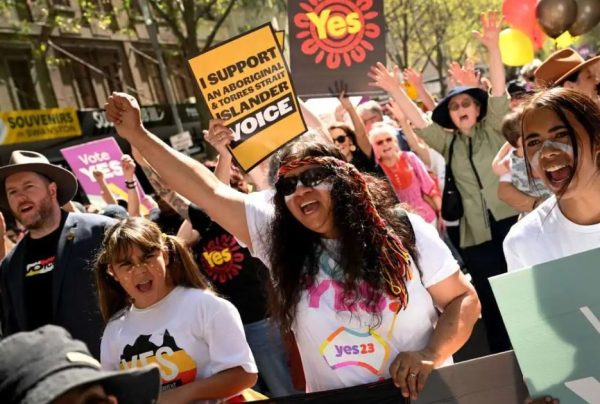Australia struggles to find its indigenous voice
September 22, 2023 · By Luke Hunt for www.ucanews.com

Crowds march during a ‘Walk for Yes’ rally in Melbourne on Sept 17. Thousands joined ‘Walk for Yes’ events in major cities, ahead of a referendum that could grant indigenous Australians a constitutionally enshrined right to be consulted on policies that affect them — a ‘Voice to Parliament’. (Photo: AFP)
Australia struggles to find its indigenous voice
Supporters of constitutional change that will guarantee Australia’s indigenous people a say in parliament are ramping up their efforts to win over a dubious middle ground after the latest opinion polls put the no campaign slightly in front.
Tens of thousands of people are staging weekend rallies in cities and towns across the country — and as far away as New York — with millions of dollars being poured into campaigning to stave off what many say is “hysterical scaremongering” by opposing conservatives.
“I’m frightened,” said Nicole, who works in a high-end fashion boutique in Melbourne.
“I’m scared the no campaign will win. I don’t understand their attitude. This is not too difficult.
“It’s just about recognizing the Aboriginals — who were here 60,000 years before European settlement — and giving them a say in regards to their affairs. I’m scared that too many Australians are racist,” she said.
The Catholic, Uniting and Anglican churches, the Australian National Council of Imams, the Executive Council of Australian Jewry, Sikh, Hindu, and Buddhist leaders have written an open letter in support of the Voice.
“Future generations of Australians will not forgive us if we fail to grasp the historical moment, and ‘advance Australia’ further along the path of justice,” the letter, signed early this year, said in part.
Australian artists, corporates and major league football and sporting clubs have also backed the yes vote but their impact seems limited.
The latest poll by RedBridge estimates 61 percent of Australians are opposed to the Voice, while just 39 percent are in favor, a spectacular fall of 21 percentage points since March when left-leaning prime minister Anthony Albanese proposed the referendum, to be held on Oct. 14.
A lack of detail about what the Voice will actually deliver has been a persistent complaint and some have argued the constitution should not be used to single one race for special treatment — including First Nations people whose rights were ignored under the British concept of Terra Nullius.
“It is my personal view that Jesus Christ would not approve of something that is going to enshrine racial privilege into the constitution and create further division in Australia and in the Church,” Joel Agius, a prominent Catholic author, wrote in the Spectator Australia.
Constitutional change requires a referendum with a double majority. For the Voice to pass, that means more than 50 percent of Australians at the federal level must vote yes, plus at least four of the six states — and that’s tricky given the different voting attitudes among them.
Increasingly voters also appear to be siding along party lines.
Right-wing conservatives have been accused of running scaremongering campaigns amid blatant lying on social media platforms in a bid to thwart the yes campaign, including a suspended doctor in the northeast state of Queensland, heartland for the no vote.
William Bay found an audience by comparing the Voice to Nazi Germany, arguing an advisory body of indigenous Australians, to be established if the yes campaign wins, would usurp existing powers and take control of parliament and the government.
Bay is wrong and the Australian Electoral Commission has noted that false commentary is at an all-time high. Most of that has been laid squarely at the feet of the no campaign and opposition leader Peter Dutton who has been accused of Trump-like “bully boy tactics.”
But even Victoria — Australia’s most progressive state — in the southeast is leaning towards the no camp and pollsters said support had also dropped among university-educated and younger voters who were widely seen as leading the yes campaign six months ago.
Polls also suggest that at least 80 percent of Aboriginal and Torres Straits Islanders — two distinct cultural groups recognized under international law — are in favor of the Voice. Those who are not, argue the Voice does not go far enough or that it is unnecessary.
The Voice emerged from the “Uluru Statement from the Heart” written by delegates to the First Nations National Constitutional Convention, held over four days near Uluru in Central Australia in May 2017.
As a result, Australians are being asked to approve alterations to the constitution so that “the Aboriginal and Torres Strait Islander Voice may make representations to the Parliament and the Executive Government ….” on issues that affect them.
Further, parliament shall “… have power to make laws with respect to matters relating to the Aboriginal and Torres Strait Islander Voice.”
The reality is parliament already has that power but constitutional change will at least formally recognize Aboriginal and Torres Straits Islanders, ensure their right to be represented through an indigenous advisory body and consign the concept of Terra Nullius to the dustbins of history.
A great hope in the yes camp is that pollsters have also registered what they call a soft vote of between 20 and 30 percent. Most of those voters are leaning towards the no camp but could swing back in the ballot box, once the campaigning is done.
But such predictions are as tricky as deciphering the different trends among the states.
One pollster even suggested that too many voters were ill-informed, apathetic and have become bored by the proposals since they were first put forward earlier this year.
*The views expressed in this article are those of the author and do not necessarily reflect the official editorial position of UCA News.






